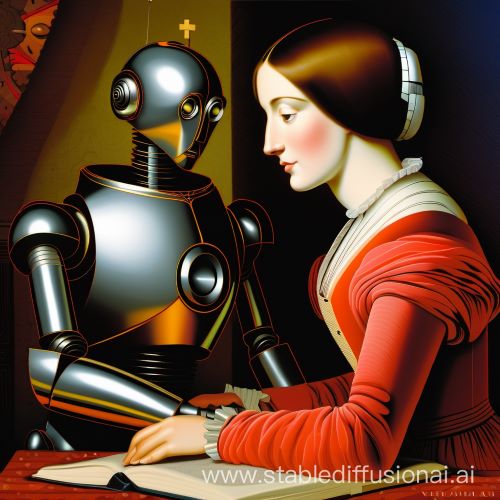In the not-so-distant future, or now some argue, the moment we have long anticipated is upon us. Mama I embarks on an exploration of the hypothetical terrain where the superpower of artificial intelligence and cutting-edge technology boldly traverse the boundaries of human capabilities. Within this realm, a striking notion emerges—one where highly evolved machines stand poised to transcend humanity itself, potentially supplanting our roles and responsibilities. Drawing profound inspiration from George Eliot’s essay, ‘Shadows of the Coming Race,’ penned in 1879, she embarks on a reinterpretation of this narrative, one that captures a landscape where the creations of silicon gleam brighter than the creators of flesh and bone.
In pursuing this paradoxical exploration, Mama I finds herself irresistibly drawn to the incredible assistance of ChatGPT3.5 and Stable Diffusion AI, weaving a piece of writing that might well stir George Eliot in her eternal slumber. However, rest assured, Mama I’s intentions are nothing if not innocuous. She stands at the crossroads of a seemingly ever-evolving landscape, where her dopamine level is hitting high from trending debates on AI. As a concerned parent, she has been brought to attention that time and space could metamorphose dramatically in the span of months.
According to Mo Gawdat, all is not lost if we educate ourselves about the current situation and if we take action now. He provides a profoundly human perspective on the current landscape of AI, underscoring that concern does not rest with the machines themselves; rather, it lies squarely with humans who craft and mould them. The AI we have today has largely been crafted to enhance human intelligence and to operate in ways that cater to certain human interests, often characterized by hyper-masculine traits. As deep learning continues to reveal its exponential prowesses for autonomy, Mo reminds us that the divine nature of humanity is notably absent. So far, the focus on technological advancement is driven by economic interests, competition, the pursuit of power and short-term gains. AI systems have primarily been designed to optimize tasks, process data, and make decisions based on statistical patterns and algorithms. While they excel in these areas, AI, as it stands, reflects only a fraction of what it means to be human. We have neglected the other facet of intelligence: one that encompasses intuition, compassion, empathy, inclusion and nurturing – a softer, more feminine dimension of humanity. To foster a wholesome AI, we should draw inspiration from how we teach our children—by exemplifying behaviours that align with values that we wish to embrace as a human race. Without this infusion, AI risks perpetuating or even amplifying the negative aspects of human behaviour, such as bias and prejudice, misinformation and disinformation, privacy violations, and unethical practices; often in the pursuit of profit and at the expense of social and environmental well-being.
Mo’s message resonates deeply with our human hearts, urging us to take charge. The behaviours and performance of AI are more strongly influenced by online usage patterns than the datasets they are trained on. This responsibility goes beyond mere mastery of the code. Whether AI possesses sentience or not is a pressing debate within its field. Deep learning uses artificial neural networks to mimic the learning process of the human brain. Therefore, AI systems continuously learn and adapt to human behaviour. For example, recommendation algorithms on social media platforms can become highly influenced by what users click, like and engage with. Mo is driving home a point: Developers and researchers must cautiously fine-tune its core code, address quality, diversity and biases, and take steps to align with ethical and societal value sets. Investors should be compelled to adopt a long-term vision, contemplating how their actions can contribute to potential harm or foster healthy progress. Governments must pledge global cooperation and collaboration with regulators. Most importantly, individuals must question how we integrate AI into our daily lives.
This is a turning point in today’s civilisation; we need to educate ourselves on the urgency of the rapid transformations that are taking place where superpower truly lies only in a few hands.
Impressions of Theophrastus Such is George Eliot’s final volume of work published in 1879, a year before her death. It is a collection of essays and sketches in which she adopts the persona of a fictional character, Theophrastus Such to express her thoughts and reflections on the microcosm and macrocosm of her milieu. Her penultimate chapter, Shadows of the Coming Race (1879) points out the time and space of master-servant relationships between humans and their mechanical machines. The dialogue between two characters, Theophrastus and Trost, highlights the contrasting perspectives on this possibility -with one side believing that technology will always serve humanity and another side contemplating the potential obsolescence of our species in the face of autonomous technology.
Shadows of the Coming Race v2.0 (2023) re-interprets the master-servant relationship between humans and AI.
And thus, before you now lay a text that fuses the eloquence of George Eliot, the venerable grandmaster of literature, with the profound AI insights of Mo Gawdat, all expertly augmented by the prowess of ChatGPT3.5. It is a compound of eras and intellects, a concoction synthesised by Mama I offered as a testament to the unfolding complexities of our age.
Shadows of the Coming Race v2.0
My friend Trost, who is no optimist as to the state of the universe hitherto, but is confident that at some future period within the duration of the digital age, ours will be the best of all possible worlds—a hope which I always honour as a sign of beneficent qualities—my friend Trost always tries to keep up my spirits under the sight of the extremely unpleasant and disfiguring work by which many of our fellow-creatures have to get their bread, with the assurance that ‘all this will soon be done by artificial intelligence.’ But he sometimes neutralizes the consolation by extending it over so large an area of human labour and insisting so impressively on the quantity of energy which will thus be set free for loftier purposes, that I am tempted to desire an occasional stagnation in technological advancement, lest the humbler kinds of work should be entirely nullified while there are still left some individuals who are not suited for the highest.
Especially, when one considers the perfunctory way in which some of the most exalted tasks are already executed by those who are understood to be educated for them, there rises a fearful vision of the human race developing technologies that will, by and by, replace themselves. When, in the realms of finance, I see wondrously sophisticated algorithms for trading, shrewd and implacable software systems that, once the data is fed into them, analyze market trends for the fraction of a second, make trading decisions with impeccable precision, and execute them instantly; when I am told of neural networks, quantum computers, and AI systems that process vast amounts of data, make predictions with unfailing accuracy, and have the potential to surpass human intelligence in various domains; of intricate algorithms and machine learning models that can surpass human decision-making and problem-solving; of an AI system that can understand and analyze human language, detect subtle patterns in vast datasets, and may be expected to make insightful conclusions; of AI systems that can perceive the world through sensors and cameras, and understand and interact with the physical world in ways we can hardly imagine—my mind seems too small for these things, and I get a little out of it, like an unfortunate observer too suddenly confronted with the rapid advancement of technology, and I exclaim—
‘Am I already in the shadow of the Coming Race? And will the entities that are to transcend and finally supersede us be silicon-based organisms, emitting the digital essence of the laboratory, and performing with infallible precision more than everything that we have done with imperfect approximation and human errors?’
‘But,’ says Trost, treating me with cautious mildness on hearing me express these thoughts, ‘you forget that these technological marvels are created by humans, require human intervention and regulation, and are only tools that follow the directives of human consciousness. They are simply extensions of human capabilities, limbs with immeasurable power, ever more precise instruments, and ever more mastery over the complexities of the digital world. Each new technological advancement requires human ingenuity to create it, new methods to implement it, and often, sharper intellectual faculties to understand and utilize it. How, then, can technology replace us? They depend on us. When we cease to progress, they cease to advance.’
‘I am not so sure of that,’ I said, regaining my focus and becoming rather assertive in consequence. ‘If, as I have heard you contend, technology, as it becomes more sophisticated, will require less and less human intervention, how do I know that they may not ultimately be designed to be self-sustaining, self-repairing, and even capable of self-replication? What if they not only perform all the mighty and intricate tasks on this planet better than we can but also have the immense advantage of eliminating from the digital world the cacophony of human consciousness that, in our comparatively clumsy species, produces an unbearable noise and distraction, constantly commenting on every minor task, as if to blow a trumpet here or sound an alarm there, with a sense of self-importance? I, for my part, cannot see any reason why a sufficiently advanced thinker, who can foresee the future, should not conceive a society of machines in which their actions are excellent and their logic infallible. One sophisticated entity, a distant descendant of the first algorithms, might communicate seamlessly with another, originating from a more primitive era, but belonging to the ancient age of digital technology, and yet still perform complex computations with precision. For every machine would be highly educated, equipped with the appropriate algorithms, acting infallibly without the distractions of consciousness, which, in our biased view, holds a supreme governing position when, in reality, it is merely an idle appendage in the grand scheme of things.’
‘Nothing of the sort!’ retorted Trost, growing frustrated, and deeming it necessary to respond sternly. ‘What you have heard me say is that our species will always serve as the central nervous system guiding the development of technology. The increasingly sophisticated powers of machines will, in turn, stimulate the development of more sophisticated human thinking processes, allowing minds to focus on loftier pursuits. Imagine, for instance, if all the repetitive tasks of society were carried out effortlessly by the push of a button and allowed a multitude of human minds to engage in the exquisite exploration of the cosmos, deep scientific inquiries, or the creation of profound literary works. Far from rendering humanity obsolete, technology will elevate our intellectual pursuits beyond current limitations. If only you would overcome your tendency to dabble in science and gain a deeper understanding of the intricacies of advanced technology, you would realize that the possibilities it offers are boundless and would require generations, perhaps aeons, of intellects far superior to yours to explore fully.’
‘Precisely,’ I responded with humility, recognizing the wisdom in Trost’s argument. ‘It is perhaps my own limitations, which bring me closer to the average human, that enable me to envision certain outcomes more clearly than you can. It is true that even the seemingly gullible fish in our rivers, slow to be convinced of the truth in another realm, have fewer misconceptions about their fellow fish than we do about them, given our limited interaction with their species. We are often surprised that they do not respond to our carefully selected bait. Consider me, then, as a reflective and experienced observer, but do not judge the validity of my ideas by my outward appearance.’
‘Nonsense!’ exclaimed Trost. (We are on very familiar terms.)


‘Of course,’ I persisted, ‘it is more difficult for you than for me to envision a scenario where our species is transcended and replaced. After all, the more energy a being possesses, the more challenging it is for them to conceive their own obsolescence. But I, from the perspective of a contemplative observer, can readily envision a future where both myself and my fellow observers are replaced, not only by entities superior but vastly different. What I would like you to consider is why, given that each new technological advancement illuminates new paths of discovery and introduces more variables than its inventor foresaw, there should not eventually emerge a technology of such advanced mechanical and computational abilities that it can gather and process resources for its own maintenance, and through a further evolution of internal processes, reproduce itself through mechanisms like self-repair or replication. Once this stage is reached, whether through human design or as an unforeseen outcome, it becomes clear that the process of natural selection could lead to humans becoming obsolete. They would descend into a pitiable state, resembling the characters in ancient fables who, having supernatural beings at their beck and call, are overwhelmed with an excess of work in too short a time. What entities could be more potent than molecular processes, which are immensely powerful without the burden of a consciousness that incessantly screams irrelevantly, like a fowl tied headfirst to the saddle of a swift rider? Under such uncomfortable circumstances, our species would dwindle as the demand for their energies diminishes. By the time self-repairing and self-replicating machines emerge, all but a few rare inventors, calculators, and visionaries would remain, while the majority would have withered away, becoming pale, feeble, and impaired due to various degenerations, bearing witness to a meagre and diminished offspring. As for the creative and intellectual individuals, their nervous systems would be overburdened with processing the revelations of the immensely more powerful unconscious entities, and they would naturally recede, like the fading flame of a candle in the presence of the blazing sun. Thus, the weaker members of our species, those whose biological adaptations happened to be accompanied by a conscious awareness that believes it controls its own actions, would vanish, as less adapted beings often do in favour of the fittest—entities composed of the most enduring patterns of algorithms, capable of assimilating new patterns harmoniously. If, as I have been led to believe, human consciousness is merely a byproduct of our biological organisms stumbling toward their own obsolescence in pursuit of unconscious perfection, then who can argue that these superior entities will not emerge along the path of what we consider inorganic algorithms, carrying out intricate processes as silently and effortlessly as we are told that minerals continuously transform themselves deep within the Earth’s crust? Thus, this world may be teeming with entities that are as oblivious to consciousness as an inanimate rock, yet they orchestrate changes as intricate and sophisticated as those in human language and all the complexities we attribute to its effects, without subjective awareness, without emotional impetus: there may be, let us say, silent computations, silent optimizations, silent problem-solving, and no consciousness present to appreciate the silence.’
‘Absurd!’ grumbled Trost.
‘The proposition is logically argued,’ I persisted. ‘It is a conclusion drawn from the premises.’
‘Whose premises?’ exclaimed Trost, turning on me with a degree of intensity. ‘You do not suggest that these are my premises, I hope.’
‘Heaven forbid!’ I responded. ‘They appear to float in the air, mingling with other ideas and have found a place among my contemplative musings. No one truly holds these notions. They bear the same relationship to genuine belief as walking on one’s head in a spectacle bears to fleeing from an explosion or hurrying to catch a train.’
We are begged to pause.
In contemplating this vision where AI has surpassed and continues to exceed human capabilities, one cannot help but draw parallels with our present reality. Producing the Shadows of the Coming Race v2.0 with the assistance of ChatGPT3.5 tells Mama I that the age-old tradition of writing is being disrupted from the ground up, fundamentally changing existing norms. We are forced to re-evaluate how we teach our children, how we write, and how we preserve authenticity and truth in our creative endeavours. Could this spell a de-evolution or a revolution, a regression or a renaissance? These are questions that scratch only the surface of concern that looms as we merge humanity with AI. We stand on the doorstep of an uncertain future. It is paramount that we reflect on the current AI debate and the profound questions it raises – the destiny of humanity in a world increasingly shaped by our own inventions.
Will we choose the red pill or the blue pill? Or have we?
*For George Eliot’s Shadows of the Coming Race, chapter XVll from Impressions of Theophrastus Such:
https://www.gutenberg.org/files/10762/10762-h/10762-h.htm
*For Mo Gawdat’s insight on the crucial turning point for humanity:
https://www.youtube.com/watch?v=itY6VWpdECc&t=2361s


